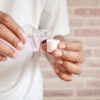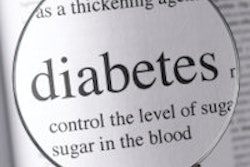
A Pennsylvania start-up is gearing up to launch a molecular saliva test that analyzes biomarkers to detect oral cancer and diabetes. PeriRx is now conducting clinical trials of its diagnostic test, which has attracted the interest of the U.K.'s National Institute for Health Research.
The genesis for the test came from a collaboration between Neil Gottehrer, DDS, a Havertown, PA, dentist who has been practicing for 38 years, and David T.W. Wong, DMD, DMSc, a pioneer in salivary diagnostics who is the associate dean of research and a professor of oral biology at the University of California, Los Angeles (UCLA) School of Dentistry.
 Neil Gottehrer, DDS, PeriRx co-founder.
Neil Gottehrer, DDS, PeriRx co-founder.
Dr. Wong's lab has been looking at salivary diagnostics for a range of illnesses, including pancreatic and lung cancers and type 2 diabetes, and he is involved in a multidisciplinary effort to create a point-of-care device for analyzing the biological markers of disease in saliva.
"I saw what he was able to do with oral cancer markers and what an impact it had," Dr. Gottehrer told DrBicuspid.com. "As a dentist, we've been trained to do cosmetic dentistry, and we would now have an opportunity to save lives."
Dr. Gottehrer then discussed the idea of a saliva test for oral cancer with his patients, Jack Martin, MD, a cardiologist from Bryn Mawr, PA, and Stephen Swanick, who became company CEO.
"They were pretty one-sided conversations," Dr. Martin joked of the chairside exchanges, which took place while Dr. Gottehrer worked on his teeth. Together, the two founded PeriRx in 2008.
Drs. Gottehrer and Martin had worked on other projects together, including one that investigated whole-body inflammatory connections.
"It's much better to create a company with patients you treat and respect professionally, so this was a natural for us to work together," Dr. Gottehrer explained.
Specific to OSCC
The molecular marker test differs from fluorescence-based imaging technologies and other testing devices because it provides an objective quantification with no subjective decisions by dentists, Dr. Martin said.
"The other tests require a lot of judgment by the practitioner about the color of lesions," he told DrBicuspid.com. "Our test produces a quantitative result with test scores that helps decide who needs to have a lesion biopsied right away because of the high chance of malignancy versus lesions that just need to be watched. So you're not doing a lot of unnecessary biopsies on people who don't need it."
Head and neck squamous cell cancer is the sixth most common type of cancer worldwide, and almost 600,000 cases are reported annually; of these, approximately 10% are oropharyngeal squamous cell carcinoma (OSCC), according to the U.S. Centers for Disease Control and Prevention.
Nearly 40,000 Americans are diagnosed with oral cancer annually, according to the Oral Cancer Foundation, and more than 8,000 die each year from the disease. Early detection of OSCC can result in 90% survival rates, but most U.S. cases are not diagnosed until stage 3, when the five-year survival rate plunges to about 43%, Swanick noted.
“As a dentist, we've been trained to do cosmetic dentistry, and we would now have an opportunity to save lives.”
About 35% of dentists screen patients for oral cancer, starting with a visual exam for lesions and often followed by fluorescence-based imaging technologies, according to Swanick.
A handful of different testing devices are on the market, but none has improved the survival rate, he said. "That's very, very daunting," Swanick said. "What we're really chasing here is a 40% improvement in the survival rate that will equate into saving more lives."
Other saliva tests check for the presence of HIV and human papillomavirus (HPV), but the PeriRx test is designed specifically to identify OSCC, he added, noting that about 90% of oral cancers are squamous cell carcinoma.
Dentists are often at the vanguard for detecting oral cancer because most patients see them more frequently than their primary care doctors, Dr. Martin noted.
"I have patients I see [for heart problems] who tell me they haven't seen their family doctor in 10 years, but they see their dentist every four months," he said. "That's why dentists are becoming more of a primary healthcare provider in screening patients for a number of systemic diseases."
With PeriRx, hygienists would collect about 3 cc of saliva and send it for lab analysis, which will also check for periodontal disease. Results would be available within 48 hours, according to the company.
"This brings hygienists much more closely into patient-involved treatment because they'll take the test and discuss the potential impact on their overall health," Dr. Gottehrer said, noting that several hygiene program directors have described this as hygienists becoming dental nurses.
"Hygienists are very anxious to participate," he said. "And it will take the responsibility off the dentist, but he makes the final decision, so it's a team effort."
Insurance companies are interested in seeing this type of technology since early detection of oral cancer reduces costs across the board, said Dr. Gottehrer, adding that many insurers now cover saliva tests.
Clinical testing
The PeriRx test was evaluated by studies that included more than 500 patients at UCLA and also patients in Serbia and India, according to data the company provided in response to queries from the National Institute for Health Research (NIHR) in the U.K. The NIHR lists promising new technology that may have a significant impact on British health.
Saliva samples from approximately 300 patients were independently validated by an independent lab of the U.S. National Cancer Institute, the company said.
The PeriRx test has been approved for sale in the European Union. The company is now enrolling patients for clinical trials at Michigan State University and the University of Michigan; the trials are expected to be completed next September. A final assay will be done by the end of 2013, and the company is planning for a U.S. launch in January 2014, Swanick said.
PeriRx plans to pursue a dual regulatory pathway to expedite getting the test to the U.S. market. It will simultaneously apply for laboratory certification and 510(k) premarket submission to the U.S. Food and Drug Administration. The company is in discussions with several large pharmaceutical companies -- including GlaxoSmithKline and Johnson & Johnson -- about teaming up to distribute the diagnostic test.
PeriRx is also in the process of drafting and creating study protocols for clinical trials testing for type 2 diabetes and prediabetes markers, its second application for the technology.
As more dentists include screening for oral cancer as part of routine exams, they are playing an increasingly pivotal role in finding the disease, Swanick said.
"We applaud the effort of U.S. dentists in the last 15 years to do something to detect this disease," he said, "And that's why we think our test will be adopted."



















